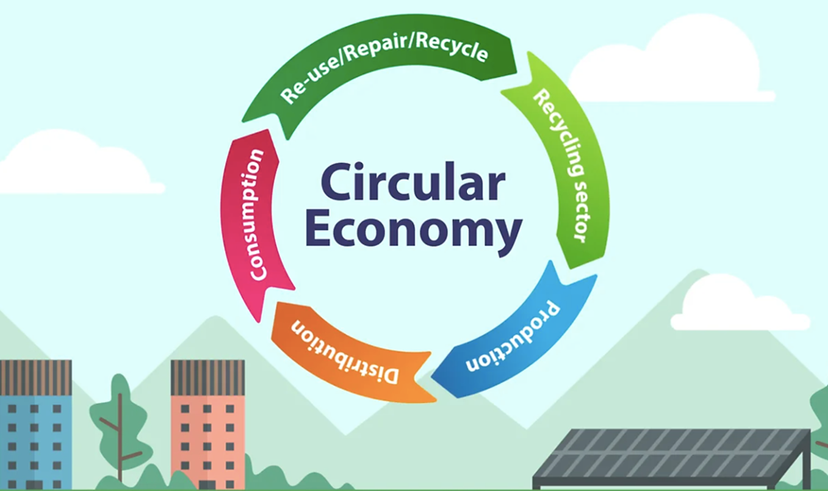Description

Copyright infringement not intended
Context: The Union Minister of Environment, Forest and Climate Change launched the Resource Efficiency Circular Economy Industry Coalition (RECEIC). The Minister said that a circular economy model would help shift from the linear “take-make-waste” paradigm and embrace a more sustainable and regenerative approach.
Details
- The Resource Efficiency Circular Economy Industry Coalition (RECEIC) is a collaborative effort involving 39 multinational corporations from various sectors, including steel, FMCG (FastMoving Consumer Goods), and electronics.
- These corporations have pledged to adopt circular economy principles to address environmental challenges, particularly those related to waste management, including plastics, microplastics, e-waste, and chemical waste.
- Resource efficiency means using natural resources in a way that minimizes environmental impacts, such as greenhouse gas emissions, water consumption, and waste generation.
- The RECEIC is open to any company or organization that shares its vision and mission, and that is willing to commit to its principles and objectives.
.jpg)
Circular Economy
About
- The concept of a circular economy has gained prominence in response to the challenges posed by the traditional linear economy, which is based on the "take-make-waste" model.
- In a linear economy, resources are extracted, processed into products, used, and eventually discarded as waste. This linear approach leads to resource depletion, environmental pollution, and waste accumulation.
- The circular economy seeks to create a closed-loop system where resources are continuously reused, repaired, remanufactured, and recycled, thereby minimizing waste generation and maximizing resource efficiency.
Features
- The circular economy focuses on regenerating natural systems, restoring ecosystems, and ensuring a positive impact on the environment.
- The emphasis is on designing products and processes to minimize waste and keep materials in circulation for as long as possible.
- Products are designed for durability, reparability, and upgradability to extend their lifespan.
- The circular economy promotes closed-loop systems, where materials are continuously circulated through reuse, recycling, and remanufacturing.
- Optimizing the use of resources to reduce inputs and minimize environmental impact.
Significance
- A circular economy promotes responsible resource management, reducing the burden on natural resources and ecosystems.
- By minimizing waste and pollution, the circular economy contributes to cleaner and healthier environments.
- Adopting circular business models can lead to new economic opportunities and job creation in the recycling, remanufacturing, and repair industries.
- A circular economy can help lower greenhouse gas emissions by reducing the demand for new raw materials and reducing energy consumption.
Steps Taken by India
- Policy initiatives: The government has introduced policy measures and guidelines to promote waste management, recycling, and sustainable consumption.
- Extended Producer Responsibility (EPR): India has implemented EPR regulations for various products, making producers accountable for their waste management.
- Swachh Bharat Abhiyan: The Clean India Mission focuses on improving waste management and sanitation infrastructure, promoting a cleaner and more sustainable environment.
- Plastic waste management: India has been actively working on managing plastic waste through various initiatives, including plastic waste recycling programs.
Challenges
- Behavioural change: Transitioning to a circular economy requires changing consumer behaviour and business practices, which can be challenging.
- Lack of infrastructure: Insufficient infrastructure for recycling, remanufacturing, and resource recovery can hinder circular economy implementation.
- Market barriers: Some circular products and services face market barriers, such as higher initial costs or limited demand.
- Informal sector involvement: The informal waste sector plays a significant role in recycling, but it also faces challenges related to health, safety, and working conditions.
- Global coordination: As resources and materials often move across borders, achieving a truly circular economy requires global collaboration and coordination.
Way Forward
- Public awareness and education: Increasing awareness about the circular economy's benefits and promoting sustainable consumption can drive behavioural change.
- Collaboration and partnerships: Governments, businesses, and NGOs need to collaborate to create enabling environments and overcome challenges together.
- Investment in infrastructure: Governments and private sectors should invest in infrastructure and technologies that support circular practices.
- Policy alignment: Ensuring policy coherence and alignment between different sectors and levels of government can facilitate the circular economy transition.
- Research and innovation: Continued research and innovation are crucial for developing new circular solutions and overcoming technical barriers.

Conclusion
- The transition to a circular economy is a complex and ongoing process, but its potential to promote sustainability, economic growth, and environmental preservation makes it a compelling pathway for a more resilient and responsible future
Must-Read Articles:
MOVING AWAY FROM TAKE MAKE DISPOSE MODEL: https://www.iasgyan.in/daily-current-affairs/moving-away-from-take-make-dispose-model#:~:text=A%20circular%20economy%20is%20an,use%2C%20and%20regenerate%20natural%20systems.
|
PRACTICE QUESTION
Q. In the context of sustainability and resource management, explain the significance of the circular economy. Identify and discuss its major challenges, and propose effective strategies or initiatives that can lead us towards a more sustainable way forward with the adoption of circular economy principles.
|
https://www.thehindu.com/news/national/tamil-nadu/39-mncs-come-together-for-circular-economy-coalition/article67128308.ece
















